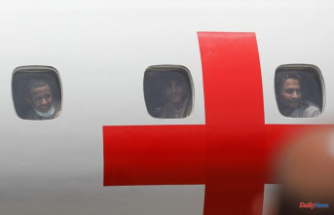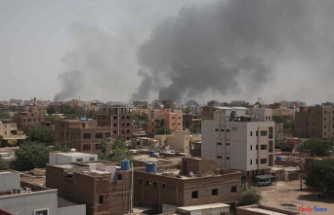Pilirani Aironi and his wife Mercy, about to give birth, have to walk 15 km through a flooded area in southern Malawi, hard hit by Cyclone Freddy, to try to reach the nearest medical facility . "We will find a way to bring him to the hospital today," wants to believe Pilirani Aironi, met on Saturday March 18 by AFP.
Their village, in the municipality of Muloza, near the border with Mozambique, was devastated by the cyclone, which left at least 438 dead, 918 injured and more than 345,000 displaced, according to the latest government report. The bad weather was so violent that new streams appeared. Six months' worth of rain fell in six days, causing mudslides and flooding that washed away homes, roads and bridges.
When an AFP journalist met them, Mercy and Pilirani Aironi, who walk barefoot, had already had to cross three of these new streams. “We knew there are more rivers on the way, but we had no choice,” says Mr. Aironi.
Located on a mountain slope, their village was almost completely swept away by a landslide caused by bad weather. Large white boulders, sand and water cover the area where houses once stood.
The injured also had to be taken to hospital on foot. Among them were eight relatives of Winditoni Makava, 75. "We carried them on our shoulders or on stretchers," he says. Nine other members of his family died in the floods, but only five bodies were recovered.
The dead and the hunger
Leaving the village is difficult and help is also struggling to arrive. AFP was able to go to the scene aboard an army helicopter carrying medical aid. But food is lacking. "We are surviving by the grace of God," says local traditional leader Manuel Nachidwa. "Most of us survive on the bananas" on the trees.
Cyclone Freddy, which dissipated this week after killing more than 570 people in southern Africa, has affected more than half a million people in Malawi. It first struck at the end of February, in Madagascar and Mozambique. It then returned to the Indian Ocean, where it gained power in the warm waters before, extremely rare, turning around to hit the continent again.
At least 89 people have died in Mulanje district, according to the official toll, but many more according to locals. “Many people are still buried under these rocks,” shows Manuel Nachidwa.
The country, which had just emerged from the most serious cholera epidemic in several decades and weakened by the lack of drinking water, hygiene measures and health and sanitation systems, finds itself once again exposed at risk of recovery. "Millions of children are at risk from a potential increase in cholera cases in Malawi and Mozambique following Tropical Cyclone Freddy, which tore through both countries for the second time in less than a month," said Unicef in a March 20 press release.












